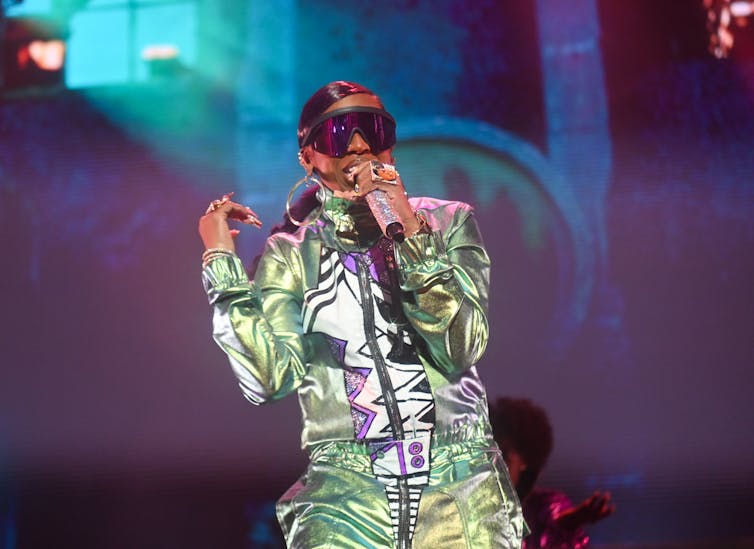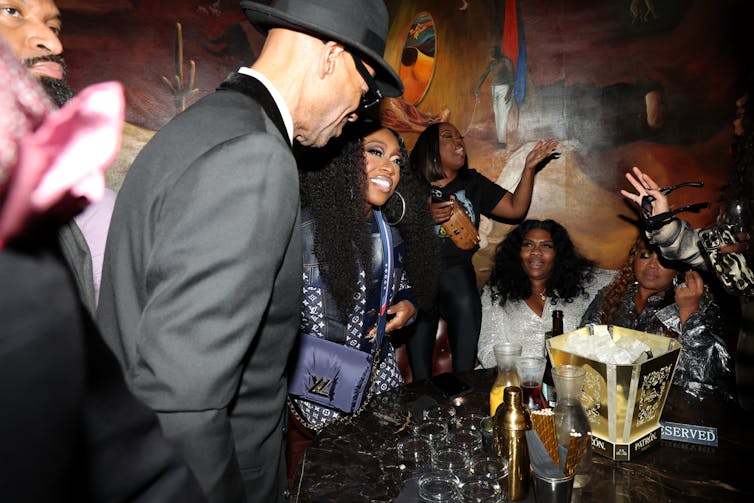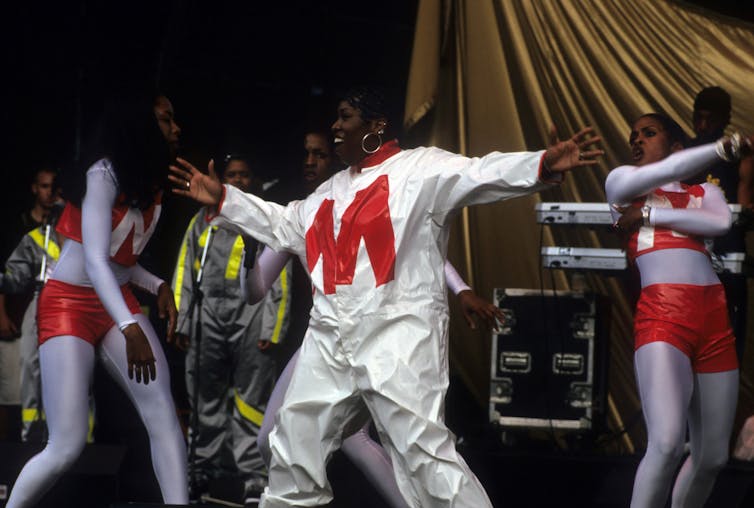
Prince Williams/WireImage by way of Getty Photographs
Elliott H. Powell, College of Minnesota
Missy Elliott’s first-ever headline tour, which stops in Philadelphia on Aug. 5, 2024, comes almost three many years after she launched her debut album, “Supa Dupa Fly,” in 1997.
For a seasoned artist like Elliott – a rapper, singer, songwriter and producer whose accomplishments embrace six platinum-selling albums, 4 Grammys and an induction into the Rock & Roll Corridor of Fame – her first expertise as a headliner could seem shockingly overdue.
As a scholar of American research and Black standard music, I’ve been writing about and discussing Missy Elliott’s artistry for over a decade.
I consider that Elliott’s lengthy wait to headline a tour is in sync with how she’s lengthy refused to be ruled by norms of time.
From her “Matrix”-inspired sophomore remedy “Da Actual World” to her old-school, hip-hop-influenced album “Below Development,” Elliott constantly reveals that she needs to be – or believes she is – not of this time.
Because the title of her tour suggests, she envisions herself “Out of This World.”


Johnny Nunez/WireImage by way of Getty Photographs
‘Funk the clock’
Students in Black research, queer research and incapacity research have explored the position of time in upholding anti-Blackness, homophobia, transphobia and ableism.
They argue that describing America as a post-racial society hinders the battle towards racism within the current, that treating queer and trans identities as one thing new or only a part results in LGBTQ+ youth being denied well being care, and that championing individuals who transfer “previous” or progress by way of their incapacity ignores systemic limitations.
To push again towards such concepts, these students clarify, Black individuals “funk the clock” by naming how we nonetheless dwell within the wake or the afterlives of slavery. Equally, queer and trans individuals “queer” time by embracing and documenting queer and trans histories. And disabled individuals “crip” time – to reclaim the pejorative time period – by slowing down and caring for his or her our bodies.
Missy Elliott is a Black lady with a incapacity – she has Graves’ illness and extreme nervousness – who breaks cultural norms of gender and sexuality.
Her music usually engages time and temporality in ways in which align with funking the clock and queering and cripping time. She performs with previous and future – treating each as various worlds, even utopias, that reject the hostilities of the current.
Supa Dupa Fly futures
On July 12, 2024, Missy Elliott made historical past as the primary Black individual, first lady, first American, first rapper and solely the second musical act – the Beatles being the primary – whose music NASA transmitted to house.
“Missy has a observe document of infusing space-centric storytelling and futuristic visuals in her music movies so the chance to collaborate on one thing out of this world is really becoming,” acknowledged NASA spokesperson Brittany Brown.
Certainly, the visible aesthetics of Elliott’s first three albums are compelling examples of such futuristic – if not outright Afrofuturist – manufacturing. They function Black cyborgs, house journey and postapocalyptic worlds.
Students have demonstrated that Black girls’s Afrofuturist music can also be usually queer, and Elliott’s work is not any exception.
Take, for instance, her 1997 hit “Sock It 2 Me,” a music a few lady in search of a sexual associate for the evening. The girl desires a associate who can “convey the nasty out of me” and permit her to “present you thangs that you would be able to’t consider.”
Importantly, Elliott doesn’t use gendered pronouns on this music. This encourages listeners to think about the lady’s associate as somebody who may very well be a variety of genders and sexualities.
The music video, in the meantime, is ready sooner or later and options Elliott and fellow Black girls rappers Lil’ Kim and Da Brat wearing Mega Man-like outfits. Elliott’s swimsuit eerily anticipates the Gmail emblem that premiered years later. The three girls keep off an invasion of robots which can be attacking a crimson planet inhabited completely by Black girls.


Steve Eichner/Getty Photographs
Futuristic queerness can also be entrance and middle in her 2001 Grammy-winning music “Get Ur Freak On.” The music video is ready in a postapocalyptic underground lair wherein Black, Asian, queer and disabled individuals dwell and dance collectively intimately.
As I’ve written elsewhere, the music’s use of the time period “freak” is telling. “Freak” resonates with how individuals of coloration, disabled individuals and queer individuals have been seen in U.S. historical past attributable to their perceived perversion. And Elliott musically gestures towards these histories by stuttering on the music, utilizing nongendered pronouns and rapping over a beat that mixes Black and Asian sounds.
In so doing, the “Get Ur Freak On” music and video provide an imagined future wherein marginalized teams discover refuge and solidarity.
Flip it and reverse it
Whereas Elliott’s first three albums explored the longer term, her most up-to-date three have highlighted the previous – most explicitly in sartorial and musical samplings of the Eighties.
Take, for instance, her 2002 Grammy hit “Work It.” The music samples Eighties rap teams RUN-D.M.C. and Rock Grasp Scott & the Dynamic Three. It’s additionally a extremely sexual music wherein, amongst different issues, Elliott discusses oral intercourse, and it famously options her rapping in reverse.
As Black feminist and queer research scholar Mecca Jamilah Sullivan argues, the music converges “backwards” sexual pleasures and sonic and erotic “reversal.” This, she writes, alerts “a broad vary of potential erotic variations and sexual deviations which may be seen as backward or perverse.”
Elliott’s efficiency on this music is emblematic of what I name the “musical aesthetics of impropriety” – a celebration of sexual needs and practices that defy norms governing Black girls’s sexuality.
When Missy Elliott stops in Philadelphia, she’s going to take audiences again in time but additionally into her imaginative and prescient of the longer term. And she’s going to achieve this in service of those that our present society marginalizes attributable to their race, gender, sexuality or incapacity.
Followers will likely be invited to think about and consider that one other world is feasible – they only have to alter the instances.
Learn extra of our tales about Philadelphia.![]()
![]()
Elliott H. Powell, Affiliate Professor American Research and Asian American Research, College of Minnesota
This text is republished from The Dialog below a Artistic Commons license. Learn the unique article.
